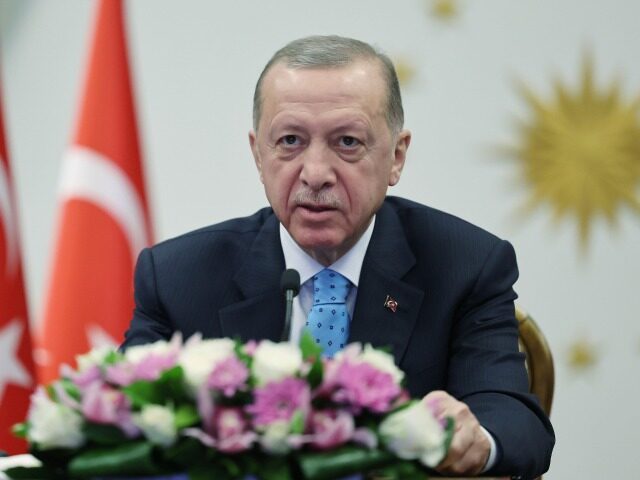Islamist Turkish President Recep Tayyip Erdogan abstained from public appearances on Friday, the third day his campaign schedule has been on hold since falling abruptly ill on live television on Tuesday.
Erdogan had been following a rigorous schedule of rallies and other public appearances in the past month in anticipation of the May 14 presidential elections. Polling shows secularist challenger Kemal Kılıçdaroğlu, the leader of the Republican People’s Party (CHP), posing a significant challenge to the incumbent, assuming a free and fair election occurs.
The office of the presidency has dismissed Erdogan’s health scare as a “stomach flu,” “cold,” or “gastroenteritis,” as described in various public statements in the past week. Erdogan’s social media profiles published a statement following the episode on television on Tuesday describing his sickness as a “minor inconvenience” and confirming that the president would have no public commitments on Wednesday but return Thursday.
The next day, Erdogan delivered a virtual speech to mark the debut of the Akkayu Nuclear Power Plant, the first such facility in the country, built in collaboration with Russia. Organizers delayed the event for nearly three hours and, when Erdogan finally surfaced, he appeared frail and clearly struggled to maintain energy during the address but was expected to return to the campaign trail this weekend.
Erdogan again canceled public appearances on Friday and delivered a virtual address, this time to inaugurate a bridge in the city of Adana, named the “July 15 Martyrs Bridge” after those who died in the alleged failed coup against Erdogan in 2016.
Erdogan took the opportunity to praise the bridge, the fourth-longest in Turkey, as a cost-saving and energy-efficient project. Erdogan also vowed that, if reelected, he would use his new term to restore the communities devastated by February’s series of severe earthquakes, which killed upwards of 45,000 people.
“We will raise our cities in the earthquake zone with 650,000 new residences in a year,” Erdogan reportedly vowed. Adana is close to the earthquake epicenter but avoided the worst devastation, taking in many of the thousands who are now homeless and displaced.
Erdogan’s limited engagements “created more room for national channels to air rallies by secular opposition leader Kemal Kilicdaroglu,” the Agence France-Presse (AFP) noted, which is a slight improvement in media prospects for the opposition despite Erdogan eliminating nearly all opposition press after the 2016 alleged failed coup. Estimates suggest that the Erdogan government shut down as many as 180 media outlets in the immediate aftermath of July 15, 2016.
AFP noted that Erdogan still has two events on Sunday and Monday on his personal agenda; his appearance or absence could fuel even wilder speculation than what is already out there. Erdogan’s campaign apparatus also scheduled a new appearance for May 7: a major rally in Istanbul, the cultural capital, at the same time as a scheduled Kılıçdaroğlu appearance in the city.
Following Erdogan abruptly ending an interview on the Turkish network Ulke on Tuesday, social media platforms — particularly Telegram and Twitter — flooded with speculation that Erdogan was facing a major health struggle. Unsubstantiated rumors, citing no clear sources, claimed that Erdogan had experienced a heart attack or was poisoned after a meeting with a Russian official. Other posts claimed, again without citing any sources, that Erdogan was hospitalized and his family had been called in on an emergency basis.
#Erdogan said that on the advice of doctors he had cancelled today's trip to #Turkish cities as part of the election campaign. The day before, during an interview with Ülke TV, he suddenly felt bad and the broadcast was interrupted, according to SonDakika. pic.twitter.com/LMgMdNF1BV
— NEXTA (@nexta_tv) April 26, 2023
Erdogan’s spokesmen effusively rejected the speculation and blamed the CHP and other opposition parties for fueling the rumors.
“They (the opposition) are trying to gain political advantage through baseless distortions even about the health condition of our president. Our president is on duty with great strength, health, and vigor,” Communications Director Fahrettin Altun asserted on Thursday. Altun did not personally blame Kılıçdaroğlu or identify any alleged opposition leader behind the supposed conspiracy to malign Erdogan.
Other online rumors revived concerns that Erdogan may be suffering from cancer. Erdogan underwent what his government described as laparoscopic “surgery on his digestive system” in 2011 to remove polyps; Turkish authorities confirmed a follow-up surgery in February 2012 but described it as “minor,” lasting about half an hour, and a follow-up to the original procedure. Erdogan denied having colon cancer at the time and has maintained since that he never suffered from that ailment.
In March 2012, the website Wikileaks published emails allegedly sourced from U.S. intelligence that described Erdogan as suffering from colon cancer and detailing that the then-prime minister’s surgery was intended to extract a significant part of his colon. The Wikileaks document claimed Erdogan had only two years to live, which Erdogan vehemently denied.
A decade later, Foreign Policy noted that videos of Erdogan circulating online appeared to depict a “gaunt,” sickly president who may not physically be able to fulfill his duties.
“In tandem with this footage are rumors about the president’s health—including stories alleging he has been dealing with increasing forgetfulness, bouts of breathing problems, confusion, vomiting, and the implantation of an internal defibrillator,” the magazine reported in 2021. “According to these same accounts, the president has increased the number of doctors around him, reduced encounters with the press, and is being pumped up with painkillers before public events.”
As it did this week, the Erdogan administration dismissed all such rumors at the time, and the president continued to show up to work without incident for another two years.

COMMENTS
Please let us know if you're having issues with commenting.